- Home
- Peter Ackroyd
The Canterbury Tales – A Retelling Page 10
The Canterbury Tales – A Retelling Read online
Page 10
‘What about young Robin? And Jill, our maid?’
‘I am afraid that they cannot be saved. Don’t ask me why. I cannot reveal the secrets of God. It must suffice that you and Alison and I will be rescued from the flood. You would be mad not to do this. So get on with it. Oh. One more thing. When you have found these three tubs, you must hang them high up from the rafters so that no one will know what we are doing. When you have done all this, and have stored all the food and drink, you must get hold of an axe. We will need it to break the ropes, and then cast off. We will also have to make a hole through the gable, over the stable, on the garden side, so that we can float free once the great rain has stopped. We will bob along as merrily as a white duck following her drake. Then I will shout to you, “Hi there, Alison! Hi there, John! Cheer up. The flood will soon be gone.” And you will shout back, “Good morning, Nicholas! I can see you again. There is daylight!” Then we will be masters of the world, just like Noah and his wife.
‘I must just warn you of one thing. On the night of the tempest, when we are safely ensconced in our tubs, we must not speak or say one word. We must stay in silent prayer. That is God’s will. You and your wife must hang some way apart, too, so that you won’t be tempted to sin with her in look, in speech or in deed. That is also God’s command. Do you understand? Tomorrow night, when the rest of the world is asleep, we will creep into our tubs. Our boats. We will sit there and wait for the grace of God. That’s it. You had better get moving. I don’t have time for any more words. There is an old saying: “Spare the words and fare the wiser.” You are wise enough already, I am sure, and don’t need to hear from me. Go and save us. That is my last request.’
So the innocent carpenter went on his way, sighing and lamenting. Of course he told Alison everything, in conditions of complete secrecy, but he might as well have saved his breath. She knew exactly what was going on, and had a pretty good idea of Nicholas’s stratagem. Nevertheless she threw herself into the part, and began to weep and wail at a great rate. ‘Alas!’ she cried out. ‘Go and do what Nicholas bids you! Help us to escape. Otherwise we are all doomed. Doomed! I am your true and faithful wedded wife. Go on, dear husband. For pity’s sake, save us!’
What a powerful agent is emotion! It is well said that men may die of imagination, if it forcibly impresses the mind. So the foolish old man begins to tremble; he begins to shake. He sees in front of him the waves and the turbulent sea; he sees Noah’s Flood come again; he sees the corpse of Alison tossed up and down. He weeps and wails, he sobs and sighs, he blubs and bawls. Then he calms down and goes out of doors to buy the three big tubs that Nicholas demanded; he has them secretly delivered, and suspended from the rafters of the ceiling. Then with his own hands he builds three ladders, by which they can climb up to safety. He is a carpenter, after all. Then he stores provisions in the tubs, namely bread and cheese and jugs of good ale just enough to last them for the one day. Before he made his preparations, however, he made sure that Jill and Robin were far away. He sent them off to London on some excuse or other. Then on the Monday evening, a few hours before the time Nicholas predicted the flood, he snuffed out the candlelight and shut the door. In perfect silence the three of them climbed the ladders and settled down in the tubs, each one apart from the other. They were silent for a few minutes, until Nicholas whispered, ‘We should say the Lord’s Prayer. And then keep quiet.’ ‘Mum,’ said John. ‘Mum,’ said Alison.
So the carpenter muttered his devotions and then stayed as still as any stone. He was listening for the onset of the rain. But he was so weary, with all the work and worry of the day, that at dusk he fell sound asleep. He was groaning and snoring. It was not a very comfortable berth. But the sound was delightful to Nicholas and Alison. Both of them softly crept down their ladders and, in silence and haste, they went off to bed. There were other noises now coming from the carpenter’s bedroom; there were squeals and sighs of pleasure. There were pantings and groanings. Nicholas and Alison kept at it all night. In fact they fucked until daylight, when the bells for lauds began to ring and the friars gathered in the choir. The pair could hear them singing.
Now. Do you remember Absolon, the love-struck parish clerk? On that Monday he was paying a visit to Osney Abbey, in the company of some other young clerics in festive mood. Quite by chance he came across the resident chorister there, and started to ask him about the old carpenter. He was always interested in that household. They were walking out of the church, when the chorister said to him, ‘I really don’t know what has happened to him. I haven’t seen him here since last Saturday. I imagine he has gone for timber somewhere. The abbot probably sent him. He often spends a day or two on one of the outlying farms, bargaining for the wood. Or else he is back at home. To tell you the truth, I don’t really know. Why do you ask?’
‘No reason. Just curious.’ Absolon was delighted. ‘Now is the time,’ he said to himself, ‘when I must stay awake all night. I don’t think he’s at home at all. I did not see him stirring this morning. And the door was closed. Just before dawn I will creep up to the house and knock softly upon the low window of his bedroom beside the orchard wall. Then I will whisper sweet love nothings to darling Alison; the least I will be offered is a kiss. My lips have been itching all day, which is a good sign. And last night I dreamed that I was at a feast. What can that mean but satisfaction? I will have a nap now, and then get myself ready for the game of the night.’
So when the first cock crowed, up sprung Absolon. He dressed himself in lover’s guise, all pert and polished, and he combed his hair. He sucked on some liquorice and cardamon seeds to sweeten his breath; cardamon is known as the grain of paradise. And paradise is what Absolon wanted. Then he popped under his tongue a four-leaved sprig of herb-paris, signifying the knot of true love, so that he might attract Alison by secret influence. Then he made his way to the house of the carpenter, and stood beneath the bedroom window. It was so low that it barely reached his chest. He leaned forward and gave a little cough. ‘Alison,’ he whispered, ‘my darling. My little honeycomb. My lovely bird. My sweet stick of cinnamon. Wake up, my sweetheart, and speak to me. You never think of my unhappiness, do you? I sweat for love of you. I really do. I faint. I repine. And, as I say, I sweat. Look at me. I am as famished as a lamb looking for its mother’s tits, if you’ll pardon the expression. I am lovelorn like the turtle. I eat less than a girl. Kiss me quick.’
‘Fuck off!’ That was Alison’s reply. ‘Go away, you fool! Kiss you quick? You must be joking. God help me, you won’t get anything from me. I love someone else, in any case, who is far more of a man than you are. Go away now or I will throw something at you. Let me get some sleep. I need it. So go to hell!’
Absolon was in a miserable state. ‘Was ever true love so thoroughly abused?’ he asked her. ‘Could I be more miserable? Have pity on me, Alison, in my distress. Give me a little kiss. That’s the least you can do. For the love of Jesus, the man of sorrows, if not for love of me.’
‘And, if I do,’ she said, ‘will you go away?’
‘Yes. I will.’
‘Then get ready. I must just do something first.’
She went over to the bed. ‘Keep quiet,’ she whispered to Nicholas. ‘And you will have a good laugh.’
Meanwhile Absolon had got down on his knees in front of the window. ‘I have scored,’ he said. ‘I don’t think she will stop at a kiss. Oh my sweetheart, be kind to me. Give me more.’
Then Alison opened the window in all haste. ‘Hurry up,’ she told him. ‘Come on. I don’t want the neighbours to see you.’
So Absolon wiped his mouth in preparation. It was very dark. It was still night, after all.
‘Here I am,’ said Alison. Then she put her naked arse out of the window. Absolon could see nothing at all, of course, and so he put out his tongue and gave her a French kiss. He was eagerly slurping her bum. But then he knew that something was wrong. He had never known a woman with a beard before. But he knew this much – he had licked on s
omething rough and hairy. ‘Fuck me,’ he said. ‘This isn’t right.’ Alison laughed out loud, and shut the window. Absolon shook his head, and began to walk away. But then he heard Nicholas laughing, too. He scowled in anger, and muttered to himself, ‘I’ll get my own back. Wait and see.’ Then he began to rub his lips and mouth with dust and straw and cloth and chips of wood – anything to get rid of the taste. He kept on repeating to himself, ‘What a mess! I would give anything to be revenged on those two. I would give my soul to the devil, I really would. If only I had turned away. If only I had not kissed that – that thing.’ His lust of course was now completely quenched. From this time forward, from the time he kissed the arse of Alison, he never looked at another woman. He was cured of lovesickness. Women? What were they to him?
So, weeping like a child that has just been whipped, he crossed the street and made his way towards the shop of a blacksmith called Gervase. Gervase forged the equipment for ploughs – that sort of thing – and just at that moment was working on a ploughshare for one of the local farmers. So Absolon knocked on the door and called out, ‘Open the door, Gervase! Hurry up!’
‘What? Who’s there?’
‘It’s me. Absolon.’
‘What in God’s name are you doing here so early? What’s the matter? Oh. I know. Some young madame has got you all excited. You rise early. You know what I mean.’
Absolon was not bothered by these sly insinuations. He had no time for joking. He had other matters on his mind. ‘I can see that hot blade in the corner of the chimney,’ he said to Gervase. ‘It’s for a ploughshare, isn’t it? Can I borrow it from you for a few minutes? I won’t need it for long.’
‘Of course you can. I would do anything for an old friend like you. You could borrow it if it were made of gold or worth a sack of sovereigns. But what on earth do you need it for?’
‘That depends. I’ll tell you all about it later.’ Then he picked up the blade – its handle was cool by now – and left the smithy.
He made his way quickly to the carpenter’s house and stood outside the window once more. He coughed softly, just like before, and knocked. ‘Who’s there?’ Alison called out. ‘Are you a thief or what?’
‘No, dear Alison,’ he said. ‘It is me again. Your darling Absolon. I’ve brought with me a gold ring. My mother gave it to me many years ago. It is of the purest gold, and engraved with a true love knot. I would like to give it you. In exchange for another kiss.’
Nicholas was out of bed and just about to take a piss. He thought that he could make the joke even funnier if he changed places with Alison and stuck his own arse out of the window. So he quickly went over to the window and thrust out his buttocks as far as he could.
Absolon called out ‘Speak to me, my little bird. I can’t see you, sweetheart.’
And, at that, Nicholas let out a fart as loud as a peal of thunder. What a noise! What a smell! You can guess what Absolon did next. He steadied the hot blade, and thrust it right up Nicholas’s arse. Oh dear. He took the skin off that fundament, and all around the edges. Nicholas was in such pain that he thought he might die, and screamed out in agony like a madman, ‘Help! Water! For God’s sake! Water!’ Now his cries awoke the carpenter, and when he heard the exclamation ‘Water!’ he started up.
‘Oh Christ,’ he said. ‘Here comes the flood!’ So he took up the axe beside him, and cut the rope that held his tub to the beams of the ceiling. Then, as the children say, all fall down. In a moment the tub plummeted to the floor. I could put it another way. He had no time to sell the bread and ale on board. He was on the floorboards, passed out. He was dead to the world.
When they realized what had happened Alison and Nicholas went out into the street calling ‘Havoc!’ and ‘Harrow!’ to wake their neighbours. And then the good people ran out of their houses to take a look at the carpenter spread out on the floor. He had broken his arm in the fall, and was generally in a sad condition. Slowly he recovered from his faint. He tried to stand up, but it did him no good. Before he could say a word Nicholas and Alison assured the crowd that he had gone mad. They said that he had become so obsessed with Noah and the Flood that he had gone out especially to buy three tubs; when these vessels were hanging from the roof, he had urged them to join him up there for the sake of company.
Then all the neighbours began to laugh at him. He was not only mad. He was a fool. They looked up at the two tubs still dangling from the roof, and laughed even harder. It was a joke. The carpenter tried to explain what had happened, but no one was in the mood to listen to him. The testimony of Nicholas and Alison was so convincing that the whole town now treated him as little more than a lunatic. Everyone agreed about that. So there we are. That is how the young scholar got to fuck the young wife, despite all the carpenter’s precautions. How Absolon kissed her arse. How Nicholas had a sore bum. And that, pilgrims, is the end of my story. God save us all!
Then the Miller fell off his horse.
Heere endeth the Millere his tale
The Reeve’s Prologue
The prologe of the Reves Tale
When everyone had finished laughing at the lewd tale of Absolon and Nicholas, they all interpreted it in different ways. There is more than one way to peel an apple. But the main response was laughter. No one took offence at it – apart from the Reeve, Oswald. He was a carpenter himself, you see, and he suffered just the tiniest bit of resentment. So he grumbled and complained under his breath.
‘If I wanted to compete with you in dirty stories,’ he eventually said to the Miller, ‘I could tell you one about your profession. I could get my own back. But I don’t want to do that. I am old. I don’t want to soil my mouth with any filth about a cuckolded miller. My grass time is done. Now I eat only winter hay. My white hairs tell my age, I know. And my heart is frail, too. It has gone to mould, like the fruit of the medlar that is ripe only when it is rotten. It is laid in rubbish or in straw, and there it sits until it falls apart like an open arse. That is what old men do. We are rotten before we are ripe. Of course we will still cut a caper, while there is a piper playing; we are always tickled by desire. It is our fate, like the leek, to have a white head and a green tail. Our strength may have gone, but the longing is still there. When we cannot do it, we talk about it. In the white ashes there still smoulders the fire, stirred by four burning embers. They are, in order, boasting, lying, rage and envy. These are the live coals of old age. Our limbs may not be supple, and our members may not rise to the occasion. But the need will surely never go away. It has been many years since I came weeping into the world, but I still have all the yearnings of a young man. The tap of my life began to run far back, further than I remember, and the years have flowed on. Death turned the tap, of course. I am flowing towards him. The vessel of my life is almost empty. There are only a few drops left. Well, I could carry on about the folly and the wickedness of times long gone. I still have a tongue in my head. But there is nothing left for old age but dotage.’
Harry Bailey, our Host, had been listening to all this. And now he spoke out peremptorily to the Reeve. ‘Do you really want to give us a sermon?’ he asked him. ‘Are you a priest? I don’t think so. The devil that turns a reeve into a preacher might just as well turn a cobbler into a sailor, or a dairyman into a doctor. Can you please just tell your story? We are already at Deptford and it is half past seven in the morning. We will soon be at Greenwich, that school for scoundrels. I know. I used to live there. So the time has come, old Reeve. Fire away.’
Oswald the Reeve took the rebuke in good spirit. ‘Now, fellow pilgrims,’ he said, ‘please do not take anything amiss. I may decide to continue in the way the Miller has begun. As they say, a nail can drive out a nail. This drunk has already told us how a carpenter was tricked. He happens to know that I am also a carpenter. What do you think? By your leave, then, I will repay him in his own coin. I will tell you a dirty story about a miller. He mocks the mote in my eye, when he cannot see the beam in his. Well, sir, I hope you break your neck.�
�
The Reeve’s Tale
Heere bigynneth the Reves Tale
At Trumpington, not far from Cambridge, there is a charming brook; above that brook, there is a bridge; beside that brook, there lies a mill. All that I am about to tell you, by the way, is true. So help me God. A miller had been living and working here for many years. He was as proud and as colourful as a peacock. He strutted about his little kingdom. He fished in the brook, he played the bagpipes; he could mend his nets and turn the lathe; he could wrestle and use a bow. On his belt there hung a cutlass with a blade as sharp as a razor. He also kept a small dagger in his pocket. I can assure you that no one dared to cross him. There was also a Sheffield knife thrust down his trousers.
He had a fat face, and a nose like a bulldog’s; he was completely bald, too. The more he swaggered, the more people were afraid of him. He swore an oath that he would repay any injury sevenfold. But this is the truth: he was a thief. He gave short weight of corn and meal. He was sly, and he never missed the chance to steal. What was his name? He was known as proud Simkin. His wife came from a noble family, and her father was the parson of the town. She was born on the wrong side of the blanket, in other words, but that made no difference. Her father gave Simkin a collection of brass dishes for her dowry; he desperately wanted the miller for a son-in-law. On his part the miller was delighted that she had been brought up by nuns. He wanted his wife to be a virgin, and an educated virgin at that. It would help him preserve his honour as a free man. She was as proud as he was, and as pert as a little magpie. You should have seen them walking around town together. On holy days he always walked ahead of her, with his hood wrapped round his head; she followed, wearing a mantle of red cloth. Simkin dressed his legs in the same colour.

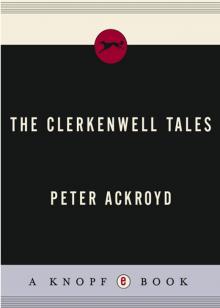 The Clerkenwell Tales
The Clerkenwell Tales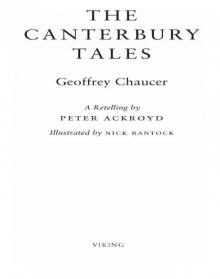 The Canterbury Tales
The Canterbury Tales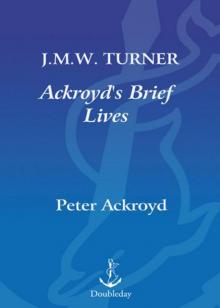 J. M. W. Turner
J. M. W. Turner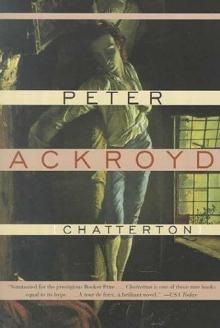 Chatterton
Chatterton The Canterbury Tales – A Retelling
The Canterbury Tales – A Retelling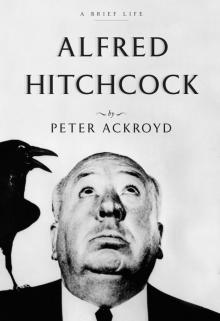 Alfred Hitchcock
Alfred Hitchcock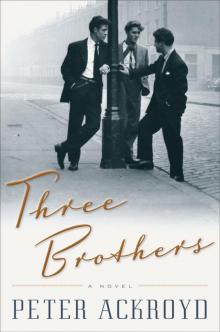 Three Brothers
Three Brothers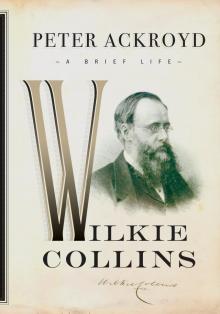 Wilkie Collins
Wilkie Collins Venice
Venice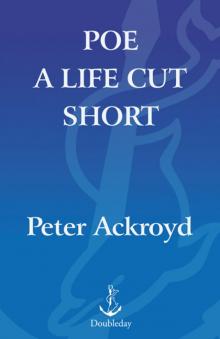 Poe
Poe The Lambs of London
The Lambs of London London
London Queer City
Queer City Revolution, a History of England, Volume 4
Revolution, a History of England, Volume 4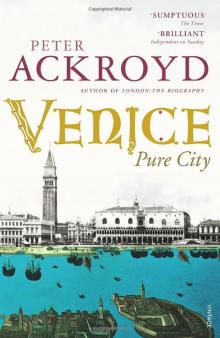 Venice: Pure City
Venice: Pure City Foundation
Foundation Thames
Thames The Plato Papers
The Plato Papers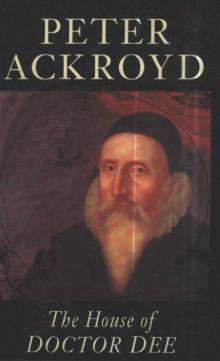 The house of Doctor Dee
The house of Doctor Dee Rebellion: The History of England from James I to the Glorious Revolution
Rebellion: The History of England from James I to the Glorious Revolution Albion: The Origins of the English Imagination
Albion: The Origins of the English Imagination The Fall of Troy
The Fall of Troy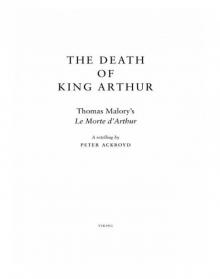 The Death of King Arthur
The Death of King Arthur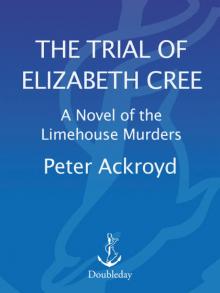 The Trial of Elizabeth Cree
The Trial of Elizabeth Cree London: The Biography
London: The Biography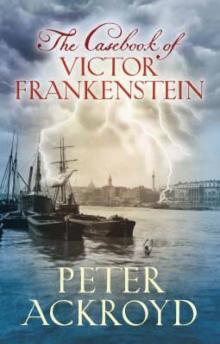 The Casebook of Victor Frankenstein
The Casebook of Victor Frankenstein Hawksmoor
Hawksmoor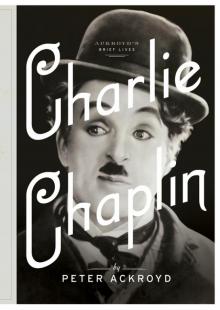 Charlie Chaplin
Charlie Chaplin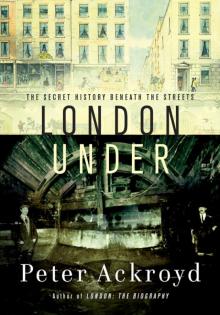 London Under
London Under